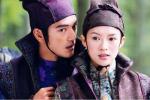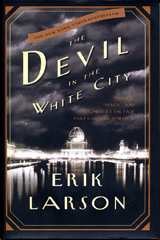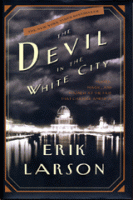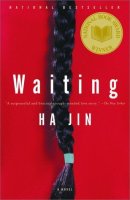(contains spoilers)
I wanted to post as soon as I finished the second part of Waiting, but I could not for the life of me put the book down. So I finished both parts in one sitting, and am now writing one post about the latter two thirds of the novel.
Language
My assessment of Ha Jin’s writing style in my previous post about Waiting, along with a few responses in the comments section, makes it seem like the novel is written in broken English, which it obviously is not. I only found instances of broken English in the dialogue, and in particular, the words spoken by Shuyu, Lin Kong’s country wife. In addition to these short bursts of broken English are shifts in language, all of which I find rather odd.
I understand that these differences are supposed to denote accents in the characters’ speech, and subsequently, social class. Since Shuyu is a simple country woman, her words are rough around the edges, which, I guess, can be conveyed through broken English (“‘You know, take off your shoes and socks is like open your pants.'” (Jin, 206)). And yet I am hesitant to accept the fact that a lower level of Chinese equates to broken English. A lower level of Mandarin consists of simpler words, fewer proverbial (and scholarly) phrases, more idiomatic expressions indigenous to a specific locale. A lower level of Mandarin does not broken English make. I think they are too separate to be made the same.
Another instance where the shift in tone/language jumps out at me is on page 157, when Manna Wu runs her bicycle into Mrs. Su’s backside. The lady, for she is the wife of a high-ranking official, cries out, “‘She was so accurate, man. Caught me right between the legs.'” Her use of the word “man” is so modern, so American, that I find the sentence forced. I understand that the author is emphasizing that people, especially of different backgrounds, sound different, but I do not think does this in a smooth, or, for lack of a better word, brilliant way. It is a half-baked attempt at trying to marry English and Chinese together. And it don’t work for me.
This it not to say that the writing is bad, mind you. I actually think the writing here is good. Simple, poetic in many ways. I read this doozy of a sentence three or four times just to glean the entire image from it: “Dark clouds were gathering in the distance, blocking out the city’s skyline; now and then a flashing fork zigzagged across the heavy nimbuses” (162). And I admire the second to last paragraph on page 177, a description of the cold night just minutes before Manna is raped by Geng Yang. I was expecting something bad to happen, and the “clouds which were swaying like waves,” “naked branches,” “slithering and twisting” snow dust foreshadows the bad thing effectively. Romanticism.
Finally, I want to mention that I find chapter 11 of Part 3 very lazy. In this chapter, Lin Kong has these question-and-answer sessions that take place inside his head, as if he is acting as his own psychiatrist. The main character reaches a series of epiphanies in this crucial chapter, but they are not the result of forces outside of himself. Though I think it is important that Lin Kong finds the ‘error’ of his ways, that he himself discovers the limits to his love, I did not expect him to reach those conclusions by simply talking to himself. Here, one of the more obnoxious passages:
The voice went on, Yes, you waited so many years, but for what?
He found his mind blank and couldn’t answer. The question frightened him, because it implied that all those years he had waited for something wrong.
Let me tell you what really happened, the voice said. All those years you waited torpidly, like a sleepwalker, pulled and pushed about by others’ opinions, by external pressure, by your illusions, by the official rules you internalized. You were misled by your own frustration and passivity, believing that what you were not allowed to have was what your heart was destined to embrace. (295)
That part is disappointing, because I don’t want, or expect, the author to spell everything out for me. It’s like the last minute of Jerry Springer where he sits on his stairs and gives the viewer his parting words, the lessons to be learned from this particular episode. It’s kind of offensive.
Oh, and one more thing about the writing. I’ve read a number of works by Asian-American writers who write in the English language, and I must say, it is wildly refreshing to read a novel about Asian characters without italicized exotic words in the text. You know how some writers, like Amy Tan (whose The Joy Luck Club is astoundingly great), will, instead of finding an English equivalent, resort to using the original Chinese/Korean/Japanese/etc. word (spelled out in English), then define said word right after? I can’t speak for non-Chinese speakers, but I assume that that can get tiring for those readers.
I’m happy to say that Ha Jin tries to tell this story using only English (whether it 100% works for me or not).
The Rape
I read in an article in The New York Times that Ha Jin had written many scenes of violence in his early works. Jhumpa Lahiri (Interpreter of Maladies), a classmate of his at Boston University, revealed, “‘He is such a gentle man, but his stories really pushed people’s buttons… There were a lot of brutal rape scenes in them. One was about a man who castrates himself. I remember people being shocked and outraged by some of it.'” Jin’s college professor even referred to Jin as a “great poet of rape.”
I knew that Manna Wu was going to be raped at some point in the novel because my eyeballs found the word ‘rape’ in one of Waiting‘s book reviews (prior to my finishing the novel). Because my eyes naturally zero in on words like ‘rape.’ As I read parts 2 and 3 I couldn’t help but anticipate the rape with each of Manna’s suitors: Lin Kong’s cousin Liang Meng, Commissar Wei. But of course, it is the bulldog-like Geng Yang who deflowers the “old virgin.”
Even though the rape is violent and somewhat shocking, there are several reasons it is necessary in the novel. First, not a lot happens in the novel (which is not necessarily a bad thing), so I’m glad that something big happens (even if it is in the form of rape). Second, the rape drastically ups the emotional (and this time, physical) toll waiting has put on Manna Wu. Forgive me for being blunt, but one of the main reasons Geng Yang rapes her is because she is a virgin; here, she truly suffers in her agonizing wait for her man, Lin Kong. Third, the rape further humiliates Manna, and, in a way, punishes her (and Lin Kong, indirectly) for having an affair. She waits and waits and waits to give herself to Lin Kong, but part of that goes to waste as soon as this brutal man, a friend of Lin Kong’s, sexually assults her.
The fact that the rapist goes unpunished (he is a wealthy, successful man later in life) has very twisted implications, which I will not need to go further into. All I would like to say is, Ha Jin has a really dark sense of humor.
Sense of Humor
As I read further into the novel, the subtle moments of irony became less subtle. By the end of the book, I chuckled in several places, knowing full well that I was supposed to. Probably the most humorous instance of irony occurs on pages 273-274, when Lin is having one of his long, twisty arguments, this time about how baby girls are just as good as baby boys and how he would rather Manna deliver a girl instead of a boy. His thoughts are duly interrupted by Haiyan, who announces that his wife has just given birth to twin boys. Oh, and by the way, your new wife is going to die soon. How’s that for life!
When these moments of irony happened one after another, I felt kind of…awkward because I did not expect a novel set during and after the Cultural Revolution to have such biting humor (though it’s buried under the surface). It seems almost…inappropriate. Plus, the overall story is so quiet and mature, like a fable. But I did welcome these ironic occurrences (and many fables are irony-filled), and Jin’s deadpan delivery of them, especially in the last couple of chapters, when Lin finally realizes that his life would’ve been perfectly peaceful had he stuck with his first wife, Shuyu.
Characters
Can I say that I do not like the main character, Lin Kong? Most heroes of stories are active, daring, passionate. Lin Kong is none of these things, and that is frustrating for a reader. It is kind of like watching a movie about writer’s block. Do you know how interesting it is to watch a movie about writer’s block? Not interesting at all. Do you know how interesting it is to read a book about a man who does nothing? Well, the same rules don’t apply to reading, I guess.
Our leading man is a sensitive, thoughtful, gentle, rational human being, but yes, he does take the easy way out, and that is not an admirable quality. I do not like him, and I do not respect him, but I understand why he is the way he is. Lin Kong is a product of his time, the changing Chinese society. He is a character stuck in transition—from the country to the city, from Old China to New China, from traditions to modernity—which is why his sense of self and his opinions are molded by outside sources. I understand that, and I feel sympathy for him, but I do not identify with him. And because I feel this distance with Lin Kong, I was not invested in his story arc, or his growth as I was nearing the end of the novel.
And I must say that Manna Wu does not get my sympathy, either.
The only character who has my full sympathy is Shuyu, who, unfortunately, we do not hear much from. The last chapter, where Lin Kong visits his ex-wife and his daughter to celebrate the Spring Festival, touches me a great deal. This woman who had been dismissed so early on, continues to be loyal, selfless, and forgiving. She seems like the type of woman who accepts her lot in life and does not step outside the boundaries others set for her. I don’t necessarily respect that about her, but I…pity her, like I pity unwanted puppies or handicapped children. And because of this, I want to slap Lin Kong silly for not manning up and being accountable for his roles as husband and father. He is a fool.
And I think that he wants to return to his former family not because he falls in love with them, or he feels comfortable with them, but because his new wife will die and he cannot take care of those babies alone. Otherwise, he would go back to his ex-wife right now. The easy thing to do is to wait for his new wife to die, then move back to his previous wife and live a peaceful life. That is the easy thing to do.
—–
I am thrilled to have read Waiting, and I hope I get the chance to read other works by Ha Jin, to see how he develops as a writer. I get my copy of Erik Larson’s The Devil in the White City tomorrow, but i look forward to others’ opinions about Waiting.





